MADAM C. J. WALKER'S WONDERFUL HAIR GROWER Tin Can Black Americana
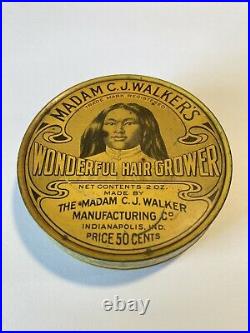
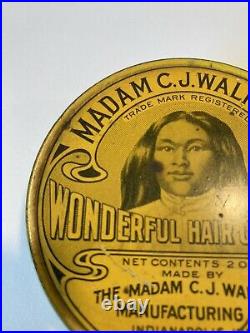
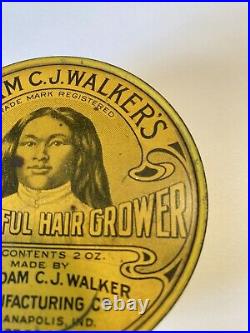
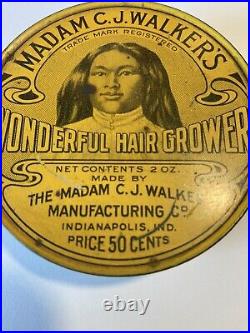
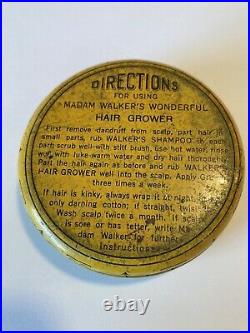
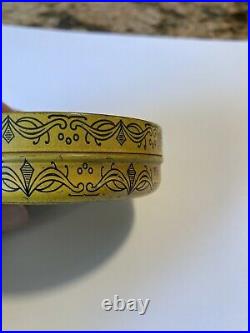
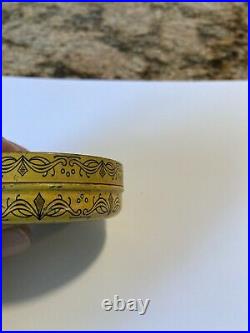
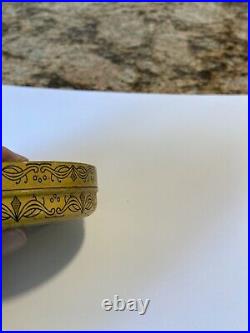
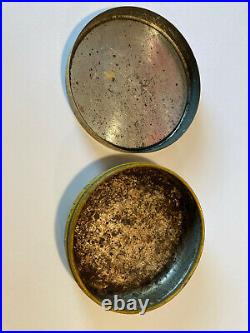
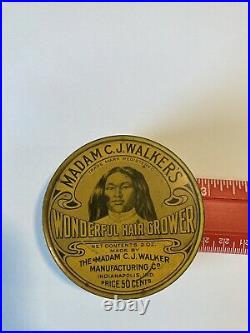

WALKER'S WONDERFUL HAIR GROWER Tin Can - Black Americana. Born Sarah Breedlove to parents who had been enslaved, she was inspired to create her hair products after an experience with hair loss, which led to the creation of the Walker system of hair care. The self-made millionaire used her fortune to fund scholarships for women at the Tuskegee Institute and donated large parts of her wealth to the NAACP, the Black YMCA and other charities.
Walker was born Sarah Breedlove on December 23, 1867. Her parents, Owen and Minerva, were. Sharecroppers who had been born into. Sarah, their fifth child, was the first in her family to be born free after the.
Her early life was marked by hardship; she was orphaned at six, married at fourteen (to Moses McWilliams, with whom she had a daughter, A'Lelia, in 1885) and became a widow at twenty. Walker and 2-year-old ALelia moved to St. Louis, where Walker balanced working as a laundress with night school. She sang in the choir of the St. Paul African Methodist Episcopal Church and became active in the National Association of Colored Women. Louis that she first met Charles J. Walker, the man who would become her second husbandand inspire the name of her eventual empire.Walker was inspired to create haircare products for Black women after a scalp disorder caused her to lose much of her own hair. She came up with a treatment that would completely change the Black hair care industry. Walkers method, known as the Walker system, involved scalp preparation, lotions and iron combs. Her custom pomade was a wild success.
While other products for Black hair (largely manufactured by white businesses) were on the market, she differentiated hers by emphasizing its attention to the health of the women who would use it. She went on to employ a fleet of saleswomen to sell the product whom she called beauty culturalists. Her products like Wonderful Hair Grower, Glossine and Vegetable Shampoo began to gain a loyal following, changing her fortunes. Walker moved to Denver in 1906 and they were married soon after. In 1908, Walker opened a beauty school and factory in Pittsburgh, Pennsylvania named after her daughter. In 1910, she moved her business headquarters in Indianapolis, a city with access to railroads for distribution and a large population of African American customers. She left the management of the Pittsburgh branch to ALelia. At the height of production, the Madame C. Walker became one of the best-known African Americans and was embraced by the Black press. The success of her business enabled her to live in homes that were a far cry from the one she had grown up in; her Manhattan townhouse became a salon for members of the.When her daughter inherited it in the 1920s. Walkers country home, Villa Lewaro, in Irvington-on-Hudson, was designed by Black architect Vertner Tandy. Walkers reputation as an entrepreneur was matched only by her reputation for philanthropy.
She established clubs for her employees, encouraging them to give back to their communities and rewarding them with bonuses when they did. At a time when jobs for Black women were fairly limited, she promoted female talent, even stipulating in her companys charter that only a woman could serve as president. She donated generously to educational causes and Black charities, funding scholarships for women at Tuskegee Institute and donating to the NAACP. And dozens of other organizations that helped make. The majority of items I list are usually from other venues/prior owners such as garage sales, estate sales, auctions and etc. As such they will not be in MINT condition unless otherwise noted. A major part of my description is in the pictures that I take of each item. Expect each item to have some wear or use consistent with being previously owned.WALKER'S WONDERFUL HAIR GROWER Tin Can Black Americana" is in sale since Wednesday, December 1, 2021. This item is in the category "Collectibles\Advertising\Merchandise & Memorabilia\Tins". The seller is "minersconsumption1" and is located in Escondido, California. This item can be shipped to United States, Canada, United Kingdom, Denmark, Romania, Slovakia, Bulgaria, Czech republic, Finland, Hungary, Latvia, Lithuania, Malta, Estonia, Australia, Greece, Portugal, Cyprus, Slovenia, Japan, China, Sweden, South Korea, Indonesia, Taiwan, South africa, Thailand, Belgium, France, Hong Kong, Ireland, Netherlands, Poland, Spain, Italy, Germany, Austria, Bahamas, Israel, Mexico, New Zealand, Singapore, Switzerland, Norway, Saudi arabia, Ukraine, United arab emirates, Qatar, Kuwait, Bahrain, Croatia, Malaysia, Brazil, Chile, Colombia, Costa rica, Panama, Trinidad and tobago, Guatemala, Honduras, Jamaica, Barbados, Bangladesh, Bermuda, Brunei darussalam, Bolivia, Ecuador, Egypt, French guiana, Guernsey, Gibraltar, Guadeloupe, Iceland, Jersey, Jordan, Cambodia, Cayman islands, Liechtenstein, Sri lanka, Luxembourg, Monaco, Macao, Martinique, Maldives, Nicaragua, Oman, Peru, Pakistan, Paraguay, Reunion, Viet nam, Uruguay. Walker's
